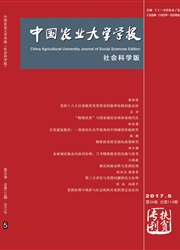

 中文摘要:
中文摘要:
转型深化期的农地产权改革需要正视农地产权的模糊性.文章从产权与市场相互关系的角度,分析了我国农地模糊产权优于俄罗斯早期农地改革,同时滞后于我国城市土地产权改革的绩效之谜问题.对于具有明显制度转轨特点的我国而言,产权与市场都是决定绩效的重要因素,适应各阶段市场发展的农地产权模糊度是农地产权改革的内在要求.减少政府的产权管制、提升农民的产权行为能力,以及完善当前包括农地市场在内的诸多生产要素市场,这些我国现阶段农地产权深化创新的关键,可以使农地产权在市场化的自由交易中内生的选择最优模糊度,从而打破城乡的二元土地制度,最优化农地绩效.另外,这个过程需要特别注意政府与市场在职能和边界上的划分,保障和吸取各地产权探索创新的试错性,在赋予和农民行为能力相匹配的产权权利时,要不断提升农民自身的行使能力,最后还要注重农地产权改革公平与效率的兼顾.影响农地产权非正式制度的形塑机理,租值耗散的经验定量特点以及模糊产权的自发演化理论含义是需要进一步探讨的方向.
 英文摘要:
英文摘要:
Ambiguity of farmland property need paying attention to during the process of farmland property reform in trans- formation period. Taking a perspective of relationship between property and market, this paper is committed to the reason why China' s ambiguous farmland property is prior to early farmland reform in Russia, but lags in China' s urban land prop- erty reform. The conclusion of the research shows that in China, with obvious characteristics of system transition, land per- formance is largely determined by property and market. Simultaneously, it' s the inherent requirements of farmland property reform to retain appropriate ambiguity to adapt to market development in each stage. At present, the key to deepen farmland property innovation is to reduce government regulation of property rights, enhance farmers' ability to conduct property, and improve current production factor markets including farmland market at the same time. Thus, it would be possible for farm- land property to choose optimal ambiguity endogenously in the free market transaction, and eventually to break dual urban- rural land system, moreover to optimize farmland performance. Additionally, farmland property innovation process should particularly differentiate the functions and boundary between government and market, also should learn from other area' s property innovation, improve farmers' ability to implement their own property when given appropriate property rights matched to their capability, and consider both fair and efficient finally during farmland property reform. Further reflection directions include mechanism that affects informal system formation of farmland property, quantitative characteristics of rent dissipation, and theoretical implications of Ambiguous property' s spontaneous evolution.
 同期刊论文项目
同期刊论文项目
 同项目期刊论文
同项目期刊论文
 期刊信息
期刊信息
